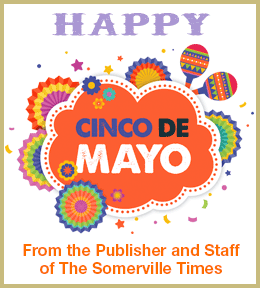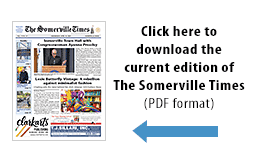 By Joseph A. Curtatone
By Joseph A. Curtatone
(The opinions and views expressed in the commentaries of The Somerville Times belong solely to the authors of those commentaries and do not reflect the views or opinions of The Somerville Times, its staff or publishers)
On Monday, we signed an agreement accepting nearly $1 billion in funding from the Federal Transit Administration, guaranteeing that the most important public transit project in the country is brought to fruition. This is a historic milestone for Somerville, the metro region and the Commonwealth. We are building more than a light rail line. We’re building the backbone of a resilient, sustainable economy. And it’s a strong economy for everyone.
We know that innovative companies are locating in places close to public transportation, and in the case of Union Square, forthcoming public transportation. When we build public transportation and then build in a smart, strategic way around transit hubs, we create the “bump factor.” We’re creating places where people can easily bump into each other; where ideas can percolate and capital can flow freely; where ideas thrive, talent is plentiful and jobs – good jobs – are the result. We can see that today in Somerville where makers, artisans and clean tech innovators are sharing ideas and working together in areas with good transit access that is about to get even better thanks to the forward-thinking commitment to public transit that is being made by our federal government and the State.
But today we are not only making an investment in public transit to spur on innovation and create the jobs we need for a thriving 21st century economy. We are coming together to build quality public transit to directly support the working people of Somerville and Massachusetts.
A car may be a convenience for those who can afford it. But for many others, it’s a necessary financial burden. For some, commuting by car is the only option to get to work to earn the money that pays the bills. And those bills include pouring income back into their car for gas, for repairs, for inspections, and so on. The cost burden of commuting for the working poor is nearly two-thirds more than other workers. If you want to ensure that the working poor and others without cars can get to work, the pharmacy, the grocery store, the doctor, or to see their extended families: Build more quality public transportation.
Two out of five low-income Latino residents who took part in a recent Dukakis Center study said that at some point they had to forgo a basic necessity to afford transportation. Driving drains the already limited amount of disposable or discretionary income available to these families. If you want families to be able to save more for bills and necessities: Build more public transportation.
A lack of quality public transportation adversely affects people’s job choices – and it can even affect their education. When someone has to take multiple public transit routes to get to work or school, it can take hours, or even all day. The difficulty in simply getting to work can prove an obstacle in getting and keeping job. That’s compounded when someone works multiple jobs to support their family, but they need to get from work to a medical appointment – or they are taking classes in addition to working full-time, so they can be more competitive in the marketplace. Roughly one out of four residents in the Dukakis Center study reported that transportation-related issues caused repeated lateness to work, and almost a third reported being repeatedly late to health care appointments or to school because of transportation issues. Do you want workers to get jobs and keep them? Do you want people to further their education while working to pay their tuition? Build more public transportation.
Of course, public transportation is not an issue that exists in a silo. Combined with a dearth of housing across a region that has not kept up with demand – especially for housing near transit centers – the expansion of public transit can affect housing costs. But that is not an argument to reject more public transportation. If low-income residents are forced to move farther away from urban employment centers, any housing-related savings are erased by higher transportation costs due to longer commutes.
This is an argument for every city and town in the region to do what they should have already been doing, and what we are doing now in Somerville: Build more housing, including affordable housing especially near transit. Our proposed zoning overhaul will make Somerville a national leader in using zoning to produce affordable housing. One in every five homes built near transit will be permanently affordable. And those affordable units will also be priced for middle income households—while still creating homes for low and moderate income households. And as we build that housing, we are strategically building more office and commercial space to bring more taxpaying businesses to the city to share the cost of the services we all rely on: public safety, roads and infrastructure, and schools.
Expanding public transportation decreases transportation costs for families, lowers unemployment, and increases earnings. It keeps more money in the pocket of our families to pay for necessities. It puts more money flowing through the economy and creates a resilient, sustainable economy. Public transit is a key step toward economic sustainability – and environmental sustainability.
Getting carbon-producing cars off the road and getting people onto greener public transit does not only create jobs and a thriving economy today. It will help create stability and thus jobs for the future. Public transit is not just an option or a just a good idea anymore – it’s an absolute necessity. If we are to responsibly address the role that our transit choices play in climate change, we cannot only celebrate the investment that is so smartly being made by our federal government in Somerville today. Tomorrow, we need to continue the hard work of ensuring that we plan and call for sustainable public transit for more cities and towns – and for our future.
The Green Line Extension from Lechmere to Route 16 is the backbone for a stronger Somerville, a stronger region, a stronger Commonwealth, and a stronger nation. Do you want more economic opportunity for all? The answer is clear: Build more public transportation.
















Reader Comments